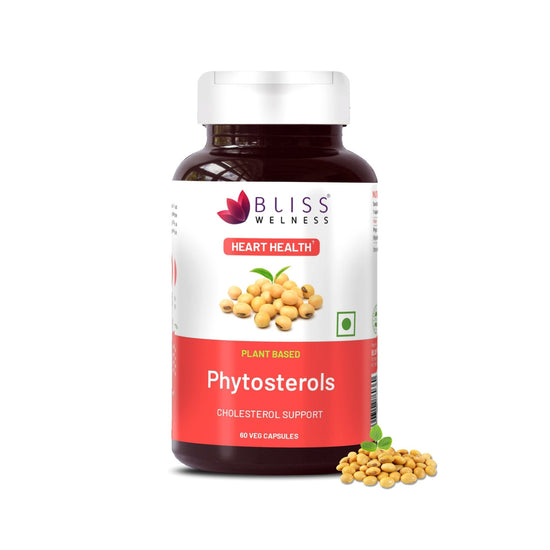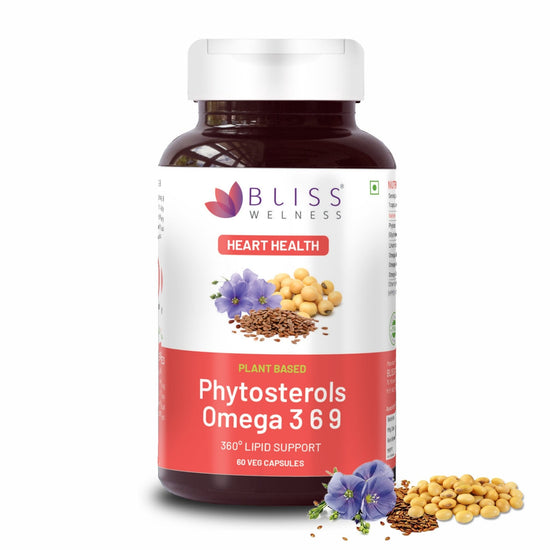3 products
-
Bliss Welness CardioBliss Gold Fish oil (2000 Omega 3 with 360 mg EPA & 240 mg DHA) for Brain Heart Eye & Joint health of Men & Women - 60 Softgel Capsules

 Bliss Welness CardioBliss Gold Fish oil (2000 Omega 3 with 360 mg EPA & 240 mg DHA) for Brain Heart Eye & Joint health of Men & Women - 60 Softgel Capsules
Bliss Welness CardioBliss Gold Fish oil (2000 Omega 3 with 360 mg EPA & 240 mg DHA) for Brain Heart Eye & Joint health of Men & Women - 60 Softgel Capsules- Regular price
-
From
Rs. 336.19 - Regular price
-
Rs. 475.24 - Sale price
-
From
Rs. 336.19
Quick view
-
Bliss Welness LipidBliss Pure Cholesterol Management | Pure Phytosterol Plant Sterols 800mg | Lipid Levels Management & Heart Health Supplement - 60 Vegetarian Capsules

 Bliss Welness LipidBliss Pure Cholesterol Management | Pure Phytosterol Plant Sterols 800mg | Lipid Levels Management & Heart Health Supplement - 60 Vegetarian Capsules
Bliss Welness LipidBliss Pure Cholesterol Management | Pure Phytosterol Plant Sterols 800mg | Lipid Levels Management & Heart Health Supplement - 60 Vegetarian Capsules- Regular price
-
Rs. 672.38 - Regular price
-
Rs. 760.95 - Sale price
-
Rs. 672.38
Quick view
-
Bliss Welness LipidBliss Plus Cholesterol Management Heart Health | Omega 3 6 9 + Phytosterol Plant Sterols | Lipid Profile Immunity Support Supplement - 60 Vegetarian Capsules

 Bliss Welness LipidBliss Plus Cholesterol Management Heart Health | Omega 3 6 9 + Phytosterol Plant Sterols | Lipid Profile Immunity Support Supplement - 60 Vegetarian Capsules
Bliss Welness LipidBliss Plus Cholesterol Management Heart Health | Omega 3 6 9 + Phytosterol Plant Sterols | Lipid Profile Immunity Support Supplement - 60 Vegetarian Capsules- Regular price
-
Rs. 697.14 - Regular price
-
Rs. 856.19 - Sale price
-
Rs. 697.14
Quick view
Exploring the World of Phytosterols: Nature's Gift for a Healthy Life
In a world where health is a paramount concern, exploring natural solutions is essential. One such natural gift is phytosterols. These plant-derived compounds offer numerous health benefits and have become increasingly popular in recent years. This article delves into the realm of phytosterols, shedding light on their significance, sources, and potential impact on well-being.
Unveiling the Basics
What Are Phytosterols?
Phytosterols, often referred to as plant sterols, are natural compounds found in various plant-based foods. They have a molecular structure similar to cholesterol, but they play a fundamentally different role in the body. These remarkable substances can be categorized into several types, including sitosterol, campesterol, and stigmasterol.
The Role of Phytosterols
Phytosterols are known for their ability to block the absorption of dietary cholesterol in the intestines. By doing so, they can help lower LDL (low-density lipoprotein) cholesterol levels in the blood, reducing the risk of heart disease. Additionally, they exhibit anti-inflammatory and antioxidant properties, contributing to their overall health-promoting effects.
Sources of Phytosterols
Plant-Based Abundance
Phytosterols are abundant in various plant-based foods. Some of the richest sources include nuts, seeds, whole grains, and legumes. Incorporating these foods into your diet can be an excellent way to increase your phytosterol intake.
Fortified Products
In recent years, many food manufacturers have recognized the health benefits of phytosterols and started fortifying their products. You can now find a range of fortified foods such as margarine, yogurt, and orange juice, making it easier than ever to boost your phytosterol consumption.
Health Benefits
Cholesterol Management
One of the most well-established benefits of phytosterols is their role in cholesterol management. By reducing the absorption of dietary cholesterol, they can help lower LDL cholesterol levels, which is crucial for cardiovascular health.
Anti-Inflammatory Properties
Phytosterols possess anti-inflammatory properties that can be beneficial for individuals with inflammatory conditions like arthritis. Including phytosterol-rich foods in your diet may help alleviate symptoms.
Antioxidant Effects
Their antioxidant properties contribute to cellular health and protection against oxidative stress. Antioxidants play a vital role in neutralizing harmful free radicals within the body, thus lowering the likelihood of developing chronic diseases.








